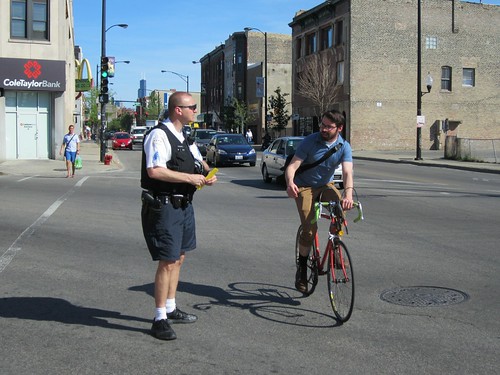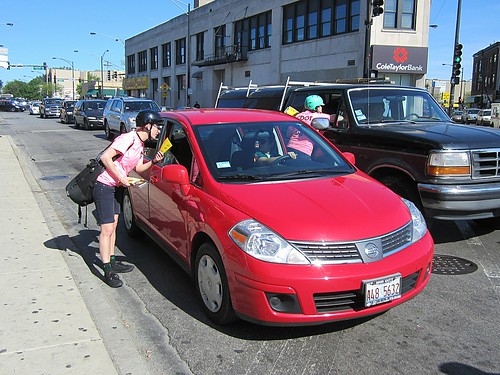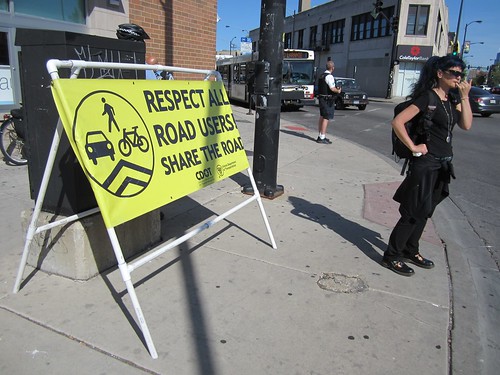Last week while pedaling downtown on Milwaukee, I came across Chicago Department of Transportation Bicycling Ambassadors and 14th District police officers doing safety outreach to people on bikes and people in cars. The ambassadors were handing flyers to motorists and cyclists reminding them not to use phones while driving and to obey traffic signals while biking. The police were flagging down adult cyclists who rode on the sidewalk or who ran red lights and giving them seemingly polite warnings that what they did was illegal.
Carlin Thomas, CDOT’s enforcement coordinator, said the response from people in cars had been mostly positive. “Most motorists are rolling down their windows at first wave, and often we’re finding that motorists are also cyclists," she said. "So sometimes they don’t even want our free information. They’re like, ‘I’m a cyclist too. I don’t talk on my cell phone [while driving].’ Every now and then we’ll get a driver who’ll quietly put down their phone and take a flyer and apologize.”
I asked Thomas if this enforcement event was related to the recently proposed Bike Safety Ordinance 2013, which would raise fees for traffic violations by bicyclists from $25 to $50-200, as well as double the fine for motorists who open car doors on cyclists to $1,000. “We’ve been doing enforcement work for the past four years,” she said. “So we’re continuing to [raise awareness of] the most dangerous behaviors out on the roadway… The ordinance proposal certainly complements what we’re doing.”
“The officers here are patrolling with a bike ambassador and pointing out people’s behavior that may increase the likelihood of a [crash] without having to write a ticket,” said Sergeant Joe Giambrone. “You see all the white 'ghost bikes' that are littering the neighborhood?” Giambrone said. “That’s because of the prevalence of all these motor vehicle-bicycle [crashes]. I can’t reach and pluck the [cyclist] out of harm’s way, but by our positive enforcement events we can hopefully raise the awareness of both the motorist and the cyclist to help prevent that.”
Later this month, First Ward Alderman Joe Moreno and 32rd Ward Alderman Scott Waguespack are sponsoring outreach events where people cycling at night without lights will be stopped by the police, then approached by ambassadors who will offer to install free lights on their bikes so they can avoid tickets. “That’s a very positive interaction,” Giambrone said. "Today tends to be a ‘slap and tickle’ – some people who don’t want to hear our advice are still going to ride badly,” he added.
I’ve heard grumbling from cyclists about the enforcement events in the past so, for a different perspective, I posted on The Chainlink, a local bike social networking website with over 8,500 members, asking whether people feel the events are helpful for encouraging safe behavior. Out of the dozen or so folks who responded, opinions on the usefulness of the stings ran about fifty-fifty.
“I can understand the good intentions behind such events, but ultimately think they're a waste of time and resources,” wrote one Chainlinker. “Those resources could be put to better use giving those polite warnings to the drivers of vehicles that are much more numerous and far more likely to cause injury or death.”
Another member complained that at two different enforcement events, police ignored other cyclists blowing a stop sign and detained her, even though she was the only one who stopped. In one case an officer told her she wasn’t really stopped unless both feet were touching the pavement.
Charlie Short, CDOT’s bike safety and education manager, contacted me offering more information about the effectiveness of the program. He said last summer the ambassadors and police officers held six enforcement events over a three-month period at the three-way intersection of Kinzie and Kingbury, which he said many pedestrians pass through while walking from the West Loop to River North. The location is also next to the East Bank Club, an upscale fitness center where Mayor Rahm Emanuel and many other wealthy and influential Chicagoans work out.
The 18th Police District and 42nd Ward Alderman Brendan Reilly's office received many complaints about bicyclists in the Kinzie protected lanes blowing stop signs at this intersection, Short said. Just before the first of the three events, CDOT staffers counted only two percent of cyclists on Kinzie observing the stop signs. After the last enforcement event, 36 percent were stopping. “Our experience on Kinzie shows that if we do it right, [enforcement events] definitely get people to be more aware,” he said.
Short said he knows cyclists want to see more efforts made to curb dangerous behavior by drivers. “Last year we stopped about 3,000 cars,” he said, adding that the police issued more than 100 citations to motorists at enforcement events for violations like talking on their phones while driving, or not moving their cars from bike lanes when requested. “We don’t discourage the police from handing out tickets to drivers.”
CDOT has also been working with the police to do crosswalk enforcement stings, ticketing drivers who don’t yield to pedestrians in crosswalks at high-conflict locations like Foster Avenue by Gompers Park. Last year CDOT held 91 enforcement events for cyclists and motorists; over 100 are scheduled for this year; and CDOT hopes to do 100 bike enforcement events plus 100 crosswalk stings per year in the future, Short said.
He acknowledged that it’s important to focus bike enforcement efforts on dangerous behavior, such as riding fast on sidewalks, riding against traffic, or recklessly blowing red lights. Police should differentiate between these actions and harmless behavior that doesn’t follow the letter of the law, such as when people on bikes treat stoplights like stop signs, or stop signs like yield signs. “We also see these enforcement events as an opportunity to educate officers about bike laws,” he said. "We try to work with officers who are willing to listen to us and willing to learn."







